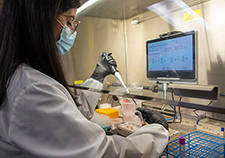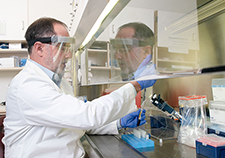Office of Research & Development |
 |
Office of Research & Development |
 |


VA is sponsoring or partnering with industry or other federal agencies on a number of clinical trials on COVID-19. (Photo: ©iStock/sturti)
May 7, 2020
Mary Kelleher and Mitch Mirkin
VA Office of Research and Development
"Together, VA and industry can rapidly generate desperately needed knowledge for the prevention and treatment of COVID-19."
As the COVID-19 pandemic unfolded across the country, VA was invited to take part in a clinical trial of remdesivir, a promising but not yet FDA-approved treatment for COVID-19. Within a record-setting four days, on March 18, the first VA site in the trial, Palo Alto, was approved to start enrolling Veterans hospitalized with the illness.
“This was a huge milestone for VA research—we cut start-up time for collaborative research from months to days,” says Dr. Molly Klote, a retired Army Medical Corps colonel who now runs the Office of Research Policy, Protections, and Education, part of VA’s Office of Research and Development (ORD).
The multisite trial is sponsored by the National Institute of Allergy and Infectious Diseases. That agency is led by Dr. Anthony Fauci, now a household name for his role in the White House response to the pandemic.
NIAID had contracted with a commercial institutional review board (IRB) to oversee the study. VA had to jump through extra regulatory hoops to join in the arrangement, but Klote’s dedicated team made it happen quickly—and made history in the process.
“This was the first time a VA research program was able to rely on a commercial IRB for the required ethical review,” notes Klote. No small feat, considering VA started doing multisite clinical trials in the 1940s.
Importantly, adds Klote, VA’s ability to now use commercial IRBs when needed “positions us to be a much more viable research partner for industry.”

AI to Maximize Treatment for Veterans with Head and Neck Cancer

VA researcher works to improve antibiotic prescribing for Veterans

VA’s Million Veteran Program played crucial role in nation’s response to COVID-19 pandemic

VA Further Develops Its Central Biorepository: VA SHIELD
Two additional VA sites, Denver and New Orleans, have since joined the NIAID remdesivir trial.
The trial is one of several focused on COVID-19 that VA medical centers are now involved in, and more trials are in the works.
“VA research is embedded in the largest integrated health care system in the country,” says Dr. Rachel Ramoni, VA’s chief research and development officer. “We’re in a position to do things that no one else in the world can do to improve the health of our Veterans, the country, and the world.”
Since assuming her role in 2017, Ramoni has made it a top priority to increase Veterans’ access to clinical trials.
With the advent of the COVID-19 pandemic, her office convened a response team that huddles daily to identify and advance research opportunities for VA investigators nationwide. They work closely with a steering committee of VA experts in virology, infectious disease, and epidemiology. That group has been doing expedited reviews of incoming ideas and proposals from VA investigators to identify the most viable and promising studies to fund.
The ORD response team is particularly focused on linking with the pharmaceutical industry. That happens through legal arrangements known as “cooperative research and development agreements.” The agreements have been used for years to allow VA to partner with companies to test promising drugs or medical devices with Veteran study volunteers.
Now these public-private contracts are especially crucial. Drug companies with promising vaccines or treatments for COVID-19 need to urgently get their products into clinical trials. “Together, VA and industry can rapidly generate desperately needed knowledge for the prevention and treatment of COVID-19,” says Ramoni.
In past years, regulatory hurdles were more cumbersome—in some cases, prohibitive. Many companies were deterred from partnering with VA to test new treatments.
Under Ramoni’s leadership, that landscape has shifted. There’s been a concerted effort since 2018, in the framework of an initiative that ORD calls Access to Clinical Trials (ACT) for Veterans, to educate potential partners—from industry as well as the federal sector—and break down barriers to collaboration.
VA is now a far more attractive partner for industry. The organization has a nationwide cadre of experienced investigators, a clinical trial infrastructure that is tested and ready to move quickly, and a large pool of potentially eligible Veterans study participants.
“We want to become the partner of choice for industry,” says Ramoni.
That’s true for COVID-19 and for other conditions, like cancer.
Ramoni points out that in the past, the average time it took to start up an industry-sponsored trial in VA was 285 days, nearly 10 months. In comparison, academic medical centers were doing it in around five months. Her office has committed to cut the VA average to about six months by October 2021, “to even the playing field.”
That’s all during normal times. During the COVID-19 pandemic, as noted above, VA is finding ways to slash the time frame more dramatically.
“A lot of what we’ve been working on is rolling out more standardized, streamlined approaches,” says Ramoni.
About a decade before it became required under 2018 federal regulations, VA implemented a central IRB to review studies for human subjects protection. That move set the stage for many of the innovations that were to follow, in terms of creating a smooth, efficient infrastructure for clinical trials involving multiple VA medical centers across the country. The central IRB solves the problem of multisite trials having to rely on multiple local IRBs, each with its own way of doing things. In the old days, that could add weeks and months to trial start-ups.
The VA central IRB currently services more than 250 multisite clinical trials in VA. Most are funded directly by VA, but many are funded by industry.
“The system ensures standardized forms and processes across all VA medical centers, so that if you want to start up a study at 10 different sites, you don’t have to fill out 10 different sets of forms,” says Ramoni.
More recently, in 2019, VA instituted an enterprise-wide software system to provide a common platform for all VA research sites to manage trials. The pandemic has slowed but not stopped the roll-out of the system nationwide.
As the country continues to cope with COVID-19, Ramoni envisions companies partnering with VA to quickly stand up their trials at numerous VA medical centers at once—at least five or so at a time.
“It takes virtually the same time to set up a trial for 20 sites as for one site,” she notes.
The nationwide scale of VA, which in the past has been part of the difficulty in organizing large trials, can be a huge research asset nowadays, given the newer infrastructure, she says.
As of May 7, VA was reporting more than 10,000 cumulative VA COVID-19 cases (active cases, plus convalescent cases and known deaths). Veterans enrolled in VA care tend to be older, often with several chronic medical conditions. This puts them at higher risk for developing severe illness from the virus.
In collaboration with other VA offices, Ramoni’s team has been monitoring patient locations and diagnosis trends to strategically select sites most appropriate for clinical trials. As the pandemic moves through the U.S., the team plots VA cases and research efforts on a heat map to provide a visual overview of the rapidly changing situation.
Her office has set up a dedicated email address for COVID-19 research, and pharmaceutical and biotechnology companies can use it to make contact and learn how to partner with VA on trials, either for COVID-19 or other conditions: ordcovid19@va.gov.
To learn more about VA research in general, visit www.research.va.gov.
VA Research Currents archives || Sign up for VA Research updates